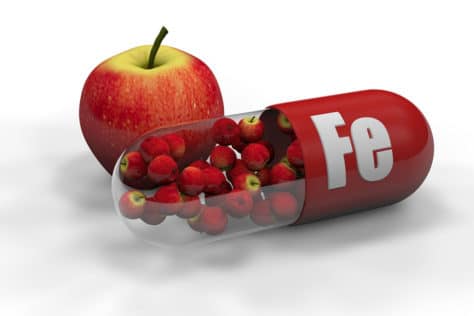What are the optimal Iron levels
People have iron increased in the red blood cells, where this value by up to 20 percent can vary. A deficiency of this important trace element can lead to symptoms, as well as a Surplus, to disease.
Table of contents
The most important facts
- Is required to of oxygen in the blood to transport.
- As the substance is ingested with food, it can easily lead to a deficiency.
- The values fluctuate in the course of the day and from meal to meal.
- The content of iron in the body is generally rather too low than too high. Both, however, have in common that they lead to severe disease symptoms.

Why do we need iron and how we take it ?
A trace element that carries oxygen in the blood and is important for the Oxidation, the generation of Energy in cells and for cell respiration. In this way, oxygen is stored in the red muscle colour. The Transport of oxygen in the cells is carried out together with the hemoglobin.
We are to lead us to the substance by the food, however, reach only about ten percent into the blood, which corresponds to five milligrams. Because the body iron that can only save in small portions, there is an ongoing need. This is one of the reasons why the deficiency is most widespread among the trace elements, wherein, in particular, women are affected.
Wherein is contain iron?
It is found mainly in animal products such as meat, where the liver contains a very high concentration. Also legumes, salsify, carrots, spinach and nuts contain proper amounts of the trace element. To note is that the body animal sources can be better than herbal. While Vitamin C improves the utilisation, tea, coffee, Calcium and phosphorus are more of a hindrance.
How can the values be calculated?
The Iron level in the blood fluctuates during the course of the day, where he reached in the afternoon the high point and the value at night is the lowest. Changes occur after eating. Once in the blood, iron binds to a protein called Transferrin, which carries out the Transport within the body. It comes to the storage of iron, it binds to the protein Ferritin. Nowadays, Doctors have noted an iron deficiency or a surplus of not more than the measurement of iron levels, but via a measurement of the Transferrin saturation. The affected parties can perform the measurement yourself by purchasing such a Test in a pharmacy.
On the basis of iron, Transferrin and ferritin levels in the medicine can determine the cause of a disturbed iron balance. Inflammation, reduces the content of iron and Ferritin. In Pregnant women, the iron content is increased, however, in the blood. The ferritin level decreases, which implies that the iron binds to the protein and cannot be saved.
Low Iron Values
– Timer can be, for example, a diet with too little iron, however, also the possibility that factors exist, which hinder the absorption of iron. For this purpose, in particular, alcoholism. Likewise, sports can lead to an under supply with iron, because we are losing great efforts in minerals and trace elements through sweat and the kidneys. Other possible triggers bowel disease, tumors, digestive problems, kidney and internal bleeding.
A major cause of iron deficiency is a strong menstrual bleeding, which is associated with endometriosis (thickening in the wall of the uterus) in women. Because Pregnant and lactating a regular basis to iron deficiency, you should take additional iron.
Differences in developed and developing countries
In the industrialized countries, blood loss due to Menstruation, accidents, tumors, or chronic inflammation of the main causes for the Occurrence of iron deficiency. In developing countries, however, the main causes are bacterial diseases such as tuberculosis and parasites triggered diseases such as Malaria or malnutrition.

How do you show an iron deficiency?
At the beginning of the body to compensate for a supply, wherein the first of the early symptoms become noticeable. Typical symptoms are dry skin, splissige hair, brittle nails, cracks at the corner of the mouth, change in mucous membranes in the mouth and a burning sensation on the tongue.
In the longer term, iron deficiency leads to a special Form of anemia. Symptomatic pallor, chronic fatigue and General being unwell, where should be noted that data freeze slightly. On top of that, the performance of the individuals is reduced, so that it is exhausted very easily. Because dizziness and headache are also side effects, suspect people who know nothing of the cause that you contracted a flu-like infection or too much negative Stress. However, symptoms such as a runny nose and cough are not part of the classical common cold to a lack of iron, especially as the fever is absent. Quite to the contrary, Sufferers can even suffer from under-temperature. Furthermore, joint pain can occur and the skin color is bronze. Heavy bleeding, diseases in the digestive system, diets, and pregnancies can lead to iron deficiency anemia.
Iron deficiency as a defense
However, such a deficiency and the resulting anemia must be in the case of infections is always negative, because bacteria and parasites need iron, because you cannot survive otherwise. To fight infections of the body’s cytokines, which increase the body temperature, which complicates the iron availability in the blood temporarily, and the growth of the pathogen is hampered. Consequently, an increased iron intake would be counter-productive.
As it comes to an increased Iron level?
If you have a deficiency in Vitamin B12 or if your body contains too little folic acid, this leads to a increase of the Iron. However, this can also be an indication of a disease. In the case of hemochromatosis, an iron storage disease, can no longer be stored in the body for example, iron sufficiently, which leads to an increase of the iron values in the blood. This can but can also be viral infections of the liver are triggered. Favoring the anti-baby pill, Estrogen, cortisone, iron supplements, and red blood cell concentrates can be rate.
The causes are:
- Hemolytic Anemia – a Form of anemia, which by the destruction of red blood cells is produced;
- Aplastic anemia – a result of reduced cell creation in the bone marrow induced anemia;
- Blood transfusions;
- to high iron intake;
- Blood Cancer (Leukemia);
- Hepatitis and alcoholism.
When to see a doctor?
You should have to diseases such as Hepatitis or leukemia, or blood as a result of accidents or surgery, lost suffering, measures the values of the medical staff in any case, your Iron. None of these diseases, however, you should consult a doctor if you
- chronically tired,
- hardly able to focus on them, “all too much”,
- You are suffering from dizziness and headaches,
- They have strong menstrual bleeding and, prior to that, and all the while, very tired feel.
What income do against Iron?
In a severe case of Excess of a vein helps let. Here, by means of an inserted needle is siphoned blood from a vein. To the disease “Polycythemia vera” – suffering people, too many blood cells, which can be reduced by multiple Aderlässe, which reduces the iron content to produce, for example.

What deficiency do against iron?
Should you wish to have a possible iron deficiency prevention, we recommend an iron rich diet with about 10-20 mg of the day. The iron deficiency has been used already, can provide you with “Superfoods” such as pistachio, chanterelle mushrooms, liver sausage, fried liver, or heart. As a vegetarian, you have access to Red beets, peas, beans and lentils.
You waive rhubarb and spinach (Oxalates), Maize and rice (suitable for vegans), black tea and coffee (tannins). You prefer to focus on beneficial foods with Vitamin C: Orange, lemon, Grapefruit, lime, peppers, or broccoli.
How common is iron deficiency?
In Germany, approximately three percent of men and ten percent of women with iron deficiency suffer.
Dietary Supplement
Caution: Before supplying iron as a food Supplement in the Form of supplements, you should discuss this in advance with your doctor to recommend a dosage. If you take too much iron supplements, whether as a juice, in the Form of capsules or tablets, this can lead to stomach problems, dark stool, vomiting, diarrhea, or even a Circulatory collapse. (Dr. Utz Anhalt)
